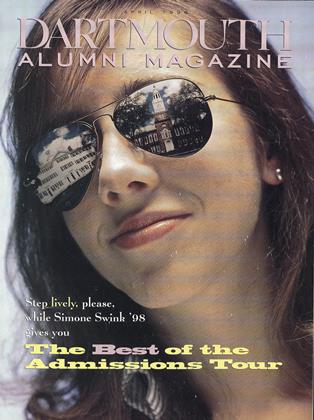"No teaching is more thrilling—or more effective—than professing original ideas."by James O. Freedman
This month's Presidential Range is excerpted from President Freedman 's speechto the general faculty, October 30,1995.
GIVEN the high esteem in which Dartmouth is held, few institutions must needs be as aware as we are that the business of colleges and universities is ideas. This means that faculty members and students are essential participants in determining the intellectual rigor and reach of what is attained in the classrooms, the laboratories, and the libraries.
It means, as well, that the most reliable index of the quality of a faculty member's thought is the strength of his or her published work, judged by peers in the world of scholarship. For the job of a professor is to extend the understanding of her discipline beyond the point where she found it, and to communicate her understanding to her colleagues and students.
Professors have a fundamental obligation to engage in the dialectic of their profession, by which questions beget answers, and answers beget further questions. An authentic commitment to scholarship is the best assurance we know of a lifetime of contagious intellectual vitality and engagement in one's field.
It is scholarship that contributes to the stream of new knowledge. It is scholarship that identifies Dartmouth as an important educational institution. It is scholarship that attracts and retains distinguished individuals as members of the faculty. It is scholarship that attracts outstanding students, many of them headed for academic careers or work as research scientists. It is scholarship that sets a standard of excellence for all the rest of our activities.
Scholarship, of course, is intimately related to teaching. It enhances and enlivens the classroom experience of students. A professor's tale of original, cutting-edge research has an unsurpassed capacity to strike a spark of curiosity and enthusiasm in students, to inspire as well as to illuminate. No teaching is more thrilling—or more effective than when a professor professes his or her own, original ideas.
Conversely, as we all know, classroom teaching enhances scholarship because it affords experts the opportunity indeed, the necessity of clarifying the issues involved in their research. T. H. Huxley, the eminent British biologist, once observed, "Some experience of popular lecturing had convinced me that the necessity of making things plain to uninstructed people was one of the very best means of clearing up the obscure corners in one's own mind."
One need only consider the large number of seminal books that began as lectures or series of lectures. The spoken lecture affords both the occasion and the vehicle by which a scholar sets down in a coherent and compelling fashion the fruit of his or her scholarship and thinking. In that way, teaching and scholarship are more even than mutually supportive activities; they are two facets of the same activity—the creation and clear conveying of new understanding.
The teacher's duty of pursuing truth is thus performed in the classroom no less than on the published page. By their example, teachers mark new paths of inquiry. They chart new avenues of investigation. They survey new fields of endeavor. They teach the moral value of inquiry, of truth, of skepticism, and finally, of discovery.
If G.K. Chesterton was right that "education is simply the soul of a society as it passes from one generation to another," then it is teachers who play the crucialindeed, critical role in that process.
I appreciate that at some institutions, dedicated and able teachers, whose truest calling is the effective conveying of the thoughts of others, regard publication as at best a distraction and at worst an inefficient use of their talents. There are those, too, who argue that effective teaching alone justifies a place on a college faculty. That may be true of some colleges, but it cannot be true of Dartmouth.
The role of the faculty member at Dartmouth is one of both scholar and teacher. These vocations are complementary, not conflicting. Dartmouth properly insists that its faculty members be effective not only in the transmission of ideas but also in their creation. Academic distinction of the kind we seek requires no less.
 View Full Issue
View Full Issue
More From This Issue
-
 Feature
FeatureSquare Legs ON THE GREEN
April 1996 By ROBERTO PARADA -
 Cover Story
Cover StoryWe asked Simone Swink '98, a student guide, to give us a short version of her spiel io visifors. Step lively, please, Any questions?
April 1996 -
 Feature
FeaturePOETS
April 1996 By Jim Schley '79 -
 Article
ArticleThe Dean Hopes for Sober Places
April 1996 By "E. WHEELOCK" -
 Article
ArticleTV Guy
April 1996 By Karen Kndicott -
 Article
ArticleOh, Professor, No Charge for You
April 1996 By Noel Perrin








